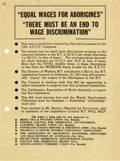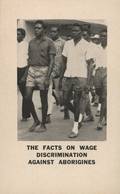Raising awareness
Educating the unions
At the 1962 Federal Council for Aboriginal Advancement (FCAA) conference, Shirley Andrews gave a powerful address setting out the facts on wage discrimination and arguing that trade unionists had a responsibility to get involved in campaigns to bring Aboriginal workers under the award system, which guaranteed a fair wage. The next year, Andrews and others lobbied Australian Council of Trade Union (ACTU) delegates, and the ACTU put out a policy position announcing 'there must be an end to wage discrimination'. Union representatives joined the Equal Wages for Aborigines Committee and helped finance a leaflet 'Equal wages for Aborigines: there must be an end to wage discrimination'. The leaflet urged unionists to protest to the Minister for Territories about the low wages for Aboriginal pastoral workers in the Northern Territory.
'There must be an end to wage discrimination', ACTU
Box 11, Folder 8, Council for Aboriginal Rights (Vic.) Papers, MS 12913, State Library of Victoria
More info on 'There must be an end to wage discrimination', ACTU
Educating the public
The next step in the consciousness-raising campaign was a leaflet titled 'The facts on wage discrimination', which pointed out that Aboriginal workers, the backbone of the pastoral industry, were specifically excluded from most pastoral awards across the country. Readers were encouraged to protest to parliamentarians, to support the efforts of the Australian Workers Union and the North Australian Workers Union and to report incidents of wage discrimination to the Equal Wages Committee. Thirty-two thousand copies of this leaflet with a photo of Aboriginal men walking straight and tall in the Darwin May Day march were distributed to unions and other members of the public.
Related resources
383616
- 383606
- 383616
- 383639
- 383670

